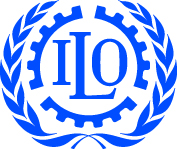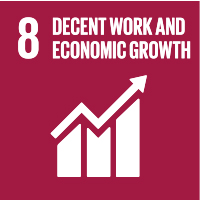Youth consultations on the forthcoming Global Employment Trends for Youth 2022 report
Are you a young person (below 30) who is enthusiastic about the future of work and would like to share your voices with the global community? Now it is your chance to contribute to a key global publication in youth employment.
Published biennially, the Global Employment Trends for Youth (GET Youth) series is a major publication of the International Labour Organization (ILO). The publication analyses the most recent labour market information available while also focussing on a key theme in the world of work facing young women and men. The 2020 edition of the report analysed the impact of technological change on youth employment and inequality (link to the 2020 report) and the forthcoming 2022 edition of the report will examine five “economies” with particular potential to create productive jobs for young workers: (i) green economy; (ii) blue economy; (iii) digital economy; (iv) creative economy and (v) care economy. Such an analysis is expected to be particularly relevant and topical as the COVID-19 global pandemic has disproportionately affected young workers and countries around the world are looking to foster longer-term investments in strategic sectors to drive inclusive growth and job creation.
The ILO, supported by AIESEC, European Youth Forum, Generation Unlimited, Office of the Secretary-General’s Envoy on Youth, Plan International, World Alliance of YMCAs and World Organization of the Scout Movement, is launching a participative process to gather ideas, views and perspectives on specific issues to be covered in the report. The active engagement of young women and men from different backgrounds and different experiences around the world in the consultations will help substantially inform and shape the GET Youth report.
Objectives
Online consultations with young women and men from around the world on specific issues in the forthcoming Global Employment Trends for Youth 2022 report will:
- Provide young people an opportunity to contribute their ideas, perspectives and knowledge to a major publication of the ILO;
- Provide a platform for youth to openly share ideas, perspectives and knowledge with each other;
- Help inform and shape the analyses and policy recommendations of the report.
Four online 60 minute consultations will be organized virtually on October 28, 2021 at 15:00-16:00 CET. Each consultation will be moderated by a young person and include a 10-15 minute overview of the topic and discussion points by ILO and other partners, followed by 20 minutes of group discussions on the topic, and concluding with 25 minutes discussion in plenary and questions and answers with the audience.
description
The consultations will cover the following areas and seek to address the following questions:
- Green and blue economies
The transition to a green and blue economy carries significant potential to generate productive jobs for youth. Such a transition also offers opportunities for intergenerational justice and partnerships. As underscored in the UN Framework Convention on Climate Change (UNFCCC): “the Parties should protect the climate system for the benefit of present and future generations of humankind, on the basis of equity and in accordance with their common but differentiated responsibilities and respective capabilities.” (Article 3.1). Intergenerational justice and partnerships have taken on added urgency as some changes in the global climate system have become irreversible as noted in the latest report of the Intergovernmental Panel on Climate Change (IPCC). Consultations with youth on the green and blue economies will focus on three questions:
- What actions are required to ensure that the transition to the green and blue economies translate into both environmental sustainability and productive employment for young women and men;
- What inter-generational partnerships can support the employment and environmental needs of older and younger generations and of present and future generations?
- How can the concerns of intergenerational justice be better integrated in economic and employment policies?
Expected participant profile for this discussion: diverse group of young women and men
- Care economy I: young women and men as care services’ users
Investments in care services bring up a triple win: allowing young women to remain in education and training and women of all ages to participate in the labour market in equal terms; in generating decent employment for women and men, thereby offering an avenue for a gender-responsive and resilient recovery; and in providing for the wellbeing and protection of those who need care, in particular young children and persons with disabilities. This consultation will focus on the first win, that is, on the availability of cares services and their impact in young women’s and men’s lives. Questions are:
- Which care responsibilities fall onto you? Who do you share these responsibilities with in your household? How do these responsibilities affect your paid work and that of other members of your household?
- Are childcare/eldercare services, schools and health facilities available for you and your family? If yes, who provides them and at which cost?
- How would your life change if they were/weren’t available? What improvements you would like to see in care services in your local community/city?
Expected participant profile for this discussion: young women and men with care responsibilities (members of young families, or caring for younger/elder members of their families)
- Care economy II: young care workers
Investments in care services bring up a triple win: allowing young women to remain in education and training and women of all ages to participate in the labour market in equal terms; in generating decent employment for women and men, thereby offering an avenue for a gender-responsive and resilient recovery; and in providing for the wellbeing and protection of those who need care, in particular young children and persons with disabilities. There is evidence that the care economy – the health sector, the education sector and domestic workers – are the biggest employers of young people in the world, a trend that intensified with the COVID-19 crisis, particularly in the health sector. As compared to young people working on other sectors, young people working in health and in education have higher educational credentials. Yet, there is also evidence that they occupy the lower-paying occupations, sometimes without clear career paths. Questions for young care workers are the following:
- What made you enter a care occupation? How do you see yourself in 10 years’ time?
- What are your conditions of work (labour rights, social protection, hours worked, earnings)? Do you see them improving in the future?
- What actions by governments and employers would improve the care service you work at?
Expected participant profile for this discussion: young care workers from health and education, with different educational credentials
- Digital economy
The digital revolution of recent decades, with its huge and increasing impact on human and economic activity, is one of the biggest drivers of transformation in all areas: the way in which humanity produces, works, learns, lives and interacts. Its impact is particularly pronounced in youth labour markets and brings many potential benefits in terms of expanding job and income generating opportunities, but also challenges, most particularly in terms of the security and stability of employment, as well as in the career development of young people. The COVID-19 pandemic has accentuated the already present strong trend towards the provision of good and services online and developments in this sector have major implications for the future of young people’s working lives. Consultations with youth on the digital economy will focus on the following types of issue and question:
- How important are digital technologies in your working and social lives today?
- What are the main positive and negative aspects of the increasingly pervasive presence of digital technologies globally; and in your life specifically?
- To what extent – and in what way – do you believe future developments in digital technologies will influence your lives? Do you see these influences as mainly positive or mainly negative? For example, do you welcome the increased flexibility that digital technologies embody and will you be able to take advantage of these to enhance your lives? Or, do you fear the increasingly rapid change and uncertainty that this implies?
- What do governments and employers need to do in order to ensure that digital technologies will improve your future working lives?
Expected participant profile for this discussion: all young people (aged 18-29) who either are working or have worked (as their primary activity) prior to COVID; not necessary any specific ‘digital’ attachment






